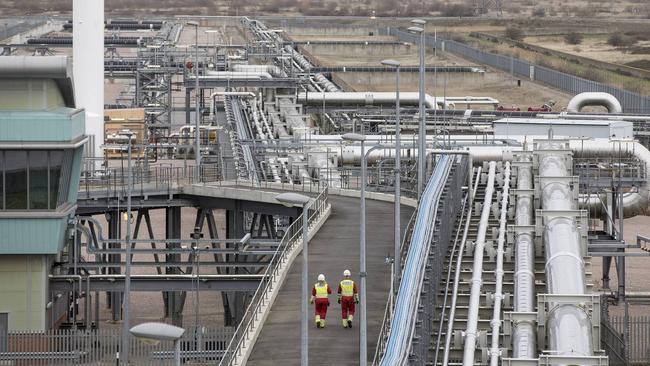Bill Johnston slams transcontinental gas pipeline plan
WA’s Mines Minister has rubbished a proposal from former premier Colin Barnett for a $5bn pipeline to the east coast.

New West Australian Mines Minister Bill Johnston has rubbished the proposal put forward by former premier Colin Barnett for a $5 billion transcontinental pipeline between WA and the east coast, arguing that the project would fail without the introduction of gas reservation policies in other states.
And Mr Johnston has also flagged a willingness to look into a permanent solution to the state’s controversial iron ore production rental levy, which became a major issue at last month’s election.
In an interview with The Australian, Mr Johnston said the transcontinental gas pipeline — which Malcolm Turnbull has called an “opportunity” under consideration by the federal government — would struggle to meet its objectives without a clear policy to set aside gas for domestic market consumption.
“Let’s understand what would happen if you build a pipeline from the west coast to the east coast — they’d export more gas from the east coast,” Mr Johnston said.
“It still doesn’t solve the problem if you still don’t have a domestic gas reservation plan. You need to make sure your country has the energy security it needs.”
WA has a policy, first introduced by the Labor government of Alan Carpenter and preserved by Mr Barnett’s former government, of reserving 15 per cent of gas from liquefied natural gas projects for the domestic market.
Mr Barnett’s proposal for a transcontinental gas pipeline, which analysts have estimated could cost about $5bn to build, was first revealed by The Australian earlier this month.
The pipeline would link WA’s prolific offshore gasfields to the South Australian energy hub of Moomba, effectively opening a pathway for that gas in the major markets of eastern Australia. The Prime Minister last week confirmed it was an option that the government would look at, noting that additional gas pipelines would increase energy security and flexibility.
But Mr Johnston said the relative stability of WA’s gas market was testament to the success of the state’s gas reservation policy, and said Australian companies concerned about energy prices and reliability on the east coast should consider moving west.
“The last Labor government introduced the gas reservation policy and clearly it’s working to prevent the problems that there are on the east coast,” he said. “Some of those companies on the east coast that are having trouble securing long-term affordable gas supply should look to WA as an investment destination,” Mr Johnston added.
The economics of the pipeline plan have also been queried by analysts. Ord Minnett on Monday calculated the project would deliver gas to Sydney at a cost of more than $13 a gigajoule, above current prices, while Credit Suisse analyst Mark Samter said the plan would be more expensive than importing LNG into the east coast.
Mr Johnston noted that the former premier had not publicly floated the idea during his time as premier, and said Mr Barnett’s previous advocacy for the ill-fated resources projects such as BHP Billiton’s disastrous hot briquetted iron plant, the abandoned James Price Point LNG site and the stalled Oakajee port development showed poor judgment.
“Colin Barnett loves to talk big when he doesn’t have control of the state, but when he had control of the state he held the state back,” Mr Johnston said. “I for one am never going to listen to the things that he recommends we do.”
Mr Johnston, who as minister will oversee the bulk of Australia’s mining and petroleum projects, also said the government was open to finding a resolution to the iron ore production rental levy.
The previously obscure provision, which sees iron ore miners charged 25c for every tonne of iron ore produced after 15 years in operation, became a focal point of the election after then leader of the Nationals in WA, Brendon Grylls, proposed lifting the fee to $5 a tonne.
The plan would have cost BHP and Rio Tinto about $3bn a year in additional taxes, and the pair funded an aggressive advertising campaign that Mr Grylls blamed for the eventual loss of his seat.
The 25c levy, which has been unchanged since the 1960s, remains in place.
While the fee primarily affects the big miners, the Association of Mining and Exploration Companies — which advocates on behalf of smaller resources companies — called for the removal of the 25c rental charge as its top policy recommendation ahead of last month’s election.
“This is a baseless, illegitimate regulation that is unfair and discriminatory,” AMEC said in its WA policy platform. “If it is ever challenged in the High Court, it would be proven unconstitutional.”
Mr Johnston said the government was willing to talk to industry about ways of reaching a solution over the charge, but cautioned that eliminating the levy was not part of the government’s policy position. “We can have a look at it (although) we don’t have an agenda to modify it,” he said.
The new minister will also be responsible for implementing Labor’s position on uranium mining. The party in WA has long held a policy on banning uranium mining, but has also made clear that uranium projects approved by the former government could still go ahead.
Projects owned by ASX-listed duo Vimy Resources and Toro Energy and Canadian uranium heavyweight Cameco were all approved during the final months of the Barnett government.

